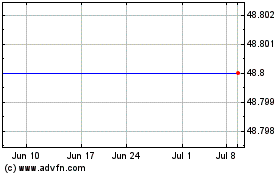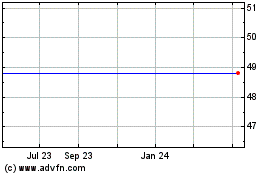ComEd Files Rate Request to Support Smart Grid in Illinois
April 16 2014 - 3:00PM
Business Wire
Customers Already Realizing Significant
Returns on 10-Year Investment in Digital Economy
ComEd today filed its annual delivery service rate request with
the Illinois Commerce Commission (ICC) to reflect grid
modernization and other service-enhancing investments across the
region. Today’s filing marks the fourth under the 2011 Smart Grid
law – the first resulting in a rate decrease – that established a
performance-based rate model to support modernizing the electric
infrastructure serving northern Illinois.
“ComEd continues to make strong progress on our 10-year
initiative to transform the electric grid for the benefit of all
our customers,” said Anne Pramaggiore, president and CEO, ComEd.
“Grid modernization is already bearing fruit with the best
reliability in ComEd history for our customers in 2013, several
thousand new jobs created and advanced tools to help customers
reduce their energy consumption and costs. These investments are
helping to connect our 4 million customers across northern Illinois
to the 21st century digital economy, contributing to the strength
of the entire region.”
ComEd’s delivery service charges would increase by about $3 on
the average monthly residential bill starting in January 2015, as
proposed to the Commission. This is based on a revenue request of
approximately $275 million to recover the cost of investments
already made in the system. The increase reflects the costs of the
Grid Modernization project that peak in the early years of
deployment, including the installation of smart meters. As work on
the program ramps down in future years, related delivery service
increases will stabilize.
In 2013, Illinois had the lowest residential electricity rates
in the Midwest and the 12th lowest rate in the U.S. Currently,
ComEd’s residential rates are essentially the same as when the
Smart Grid program was enacted in 2011 and well below the average
of leading U.S. cities.
Today’s filing complies with the annual rate-setting process
established by the Energy Infrastructure Modernization Act (EIMA)
enacted in 2011. In each annual filing, utilities submit their
previous year’s actual expenses and the current year’s projected
capital investments. The ICC has eight months to make a
determination on the rate request.
Over the past two years, EIMA investments resulted in
approximately 500,000 fewer customer interruptions, producing
estimated customer savings of $82 million, said Pramaggiore.
ComEd’s system reliability performance in 2013 ranked in the top
decile of performance among peer utilities and has ranked in the
top quartile in four of the past five years. By the end of the
program, the modernization investments ComEd is making are expected
to result in 700,000 fewer outages per year – savings customers
$100 million annually in related costs.
ComEd also recently announced that work related to its sweeping
smart grid initiative supported 2,871 full-time equivalent
positions in 2013. The positions included nearly 1,000 direct
full-time equivalent jobs at the utility and its contractors as
well as more than 1,800 indirect positions created by the effect of
$253 of capital investments in the program in 2013. ComEd works
with the Regional Economic Applications Laboratory (REAL) at the
University of Illinois to calculate the number of indirect
positions resulting from the smart grid investment.
An upgraded, stronger electric system, fewer power interruptions
and greater operational efficiencies will result in savings of
approximately $2 billion over 20 years. These savings, which will
be passed on to ComEd customers, are in addition to savings that
customers can realize with digital smart meters, which provide
greater control over energy consumption and costs as well as easier
access to new pricing programs that shift usage to times of day
when energy costs are lower.
ComEd has filed a request with the ICC to complete the
installation of more than 4 million smart meters by 2018, ahead of
the currently scheduled 2021. If approved, the accelerated program
would begin this year, increasing the number of smart meters
installed in 2014 from 160,000 to 500,000. The acceleration is
expected to save customers an additional $170 million compared to
the current schedule. The ICC is expected to announce its decision
on the accelerated plan in May.
ComEd also is leveraging smart grid investments to help
residential customers and nonprofit organizations that need
assistance in paying their energy bills. This support comes in the
form of direct financial assistance as well as flexible billing and
payment options for low-income, active military members and
veterans, senior citizens and those facing financial hardships. The
utility announced in March that it has dedicated $10 million in
CARE customer assistance funds for the third consecutive year, as a
result of the Smart Grid law. Last year through the CARE programs,
ComEd was able to help more than 28,000 customers with their
bills.
Commonwealth Edison Company (ComEd) is a unit of Chicago-based
Exelon Corporation (NYSE: EXC), the nation’s leading competitive
energy provider, with approximately 6.6 million customers. ComEd
provides service to approximately 3.8 million customers across
northern Illinois, or 70 percent of the state’s population.
ComEd Media Relations(312) 394-3500
Exelon (NYSE:EXC)
Historical Stock Chart
From Mar 2024 to Apr 2024

Exelon (NYSE:EXC)
Historical Stock Chart
From Apr 2023 to Apr 2024
